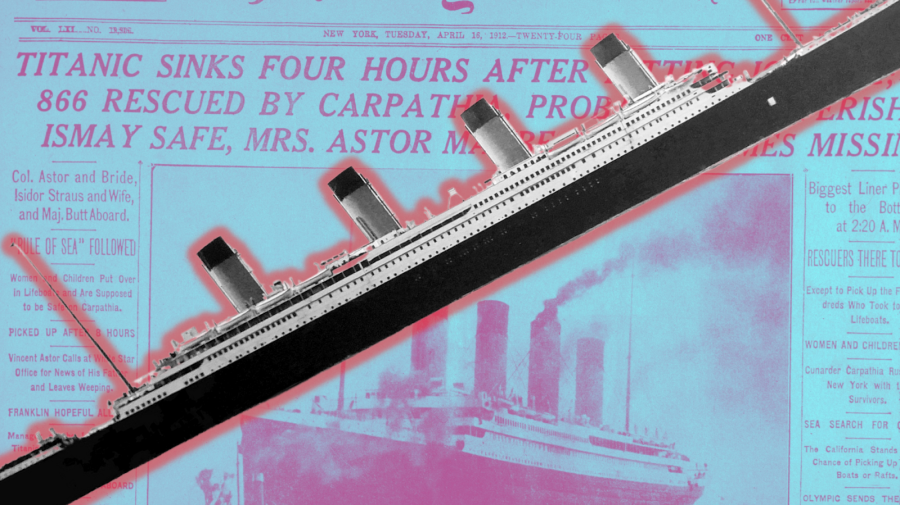Story Behind Song Tell It Again

The sinking of The RMS Titanic is, without a doubt, one of the defining events of the 20th century. Almost immediately, the story captured the attention of people around the earth. It's a story of hubris ("The boat is unsinkable," said Philip Franklin, vice president of White Star Line in 1912), but it'due south also a story of sacrifice and heroism (Major Archibald Barrel, for case, and countless others died helping others survive).
Songs have been a major part of the cultural experience and remembrance of the Titanic. The tragedy has been immortalized in vocal numerous times over the 110 years since the ship's sinking. From Leadbelly'due south "The Titanic," to Blind Willie Johnson'southward "God Moves on the Water," to Bob Dylan'south much more than gimmicky "Tempest," the famous sunken ship is an irresistible subject.
At that place are other musical associations: Celine Dion's megahit, "My Heart Volition Continue," from the soundtrack to James Cameron'due south 1997 blockbuster, Titanic, and the hymn, "Nearer My God to Thee," which was famously the alleged last song played by the ring on the ship itself. But the vocal that is perhaps almost closely associated with the tragic issue is a melody that's thought to accept been written past William and Versey Smith, a hubby and wife religious blues duo from either Texas or The Carolinas. Called "When That Great Ship Went Downward," it'southward been covered and performed by endless musicians and summertime campsite attendees over the past century or and then — but why?
Attitudes About the Sinking Ship

There was, of course, a great deal of mourning following the news that the "unsinkable" ship had, in fact, sunk. The loss of life was staggering; over 1500 people died — far more than survived. For Black Americans, in that location was some irony here. William and Versey Smith'south 1927 recording of "When That Slap-up Ship Went Downwards" is featured in the famous 1952 Harry Smith Anthology of American Folk Music, and the liner notes explicate that Black musicians "found it noteworthy and ironic that company policies had kept Black [people] from the doomed ship; the sinking was too attributed by some to divine retribution."
Divine retribution or non, every bit Henry Louis Gates points out, statements similar the one in the Washington Post from 1912 — that much of the sadness of the tragedy was due to "the character and importance of many of those who sank" — landed such that they "practically dared African Americans to insert themselves into the Titanic narrative." In fact, there was a Black man on the Titanic, Joseph Laroche, whose story is interesting in and of itself, but that wouldn't be widely known until much, much after.
Myth and History
In the moment, Black Americans attempted to situate themselves in the story through myth and commentary. Gates describes the pop rumors of the day, one of them that the famous boxer Jack Johnson had tried to board the Titanic simply was refused entry considering of the color of his skin (this myth was immortalized in the Leadbelly vocal mentioned above).
Ballads similar Leadbelly's and the one by William and Versey Smith were another mode for Blackness Americans, suffering so many tragedies of their own, to comment on their absence from this particular instance of cultural mourning. During the earlier era of slavery, as Kenyatta D. Berry points out, "Music was a way for [enslaved people] to express their feelings whether it was sorrow, joy, inspiration or hope." This tradition of expression through music is a key part of the experience of Black ballads about the Titanic, specially "When That Great Transport Went Down."
Singing in Sadness

The idea that singing might exist a way to cope with sadness should probably be no slap-up revelation, but it tin feel a trivial jarring when you're singing and so realize what's going on in the words you're proverb. The famous chorus of "When That Peachy Ship Went Down" goes: "It was lamentable when that groovy send went down / It was sad when that great ship went downwardly / Husbands and wives and little children lost their lives / Information technology was sad when that great transport went down."
If that feels distasteful to you, I can't quite arraign y'all, only I've always felt a kind of blitz in the disconnect between the meaning of the words and the feeling of the song. To sing such devastating truth then joyously is, perhaps, a little cathartic — a way of taking back a lilliputian ability in the face up of a universe that can seem cruel sometimes.
I recently wrote about National Poetry Month that sometimes poetry can evangelize data you didn't know you needed. It is much the same with songs; it tin can be tempting to think that it's the words themselves that comprise the information, merely that's not the whole truth. How we experience is a mysterious combination of the words, the sounds, and what's already in our hearts.
Source: https://www.ask.com/culture/story-of-the-song-titanic?utm_content=params%3Ao%3D740004%26ad%3DdirN%26qo%3DserpIndex
0 Response to "Story Behind Song Tell It Again"
Post a Comment